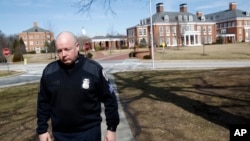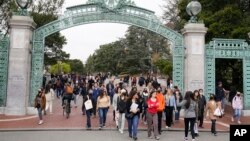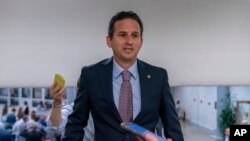Student Union
The US in Words #7: YOLO (Finding a Better Version of Myself)
The seventh in a series looking at U.S. life and culture through its idioms. View previous entries.
YOLO = You only live once
A friend who I had met at a hostel in Philadelphia recommended I get a tattoo with the inscription "YOLO," which stands for "You Only Live Once." I hadn’t heard the phrase before, but suddenly it seemed to capture something about my life.Through my experience in the U.S. I have come to be, not someone else exactly, but a more defined, and perhaps better, version of myself, who seeks adventure rather than comfort, and who prefers new experiences over routine.
The person I was a few months ago wouldn’t have been friends with someone I’d met in a hostel, and the person I was a few months ago definitely wouldn’t have been genuinely considering getting a tattoo.
I don’t think it’s the U.S. itself that has made me change, but rather to the opportunity to gain some distance from my normal life and look at it from the outside, gaining a different perspective. I’ve left my country and my family, I’ve adapted to a new environment and culture, I’ve made new friends, I’ve assimilated to different work practices, adopted new habits, learned about other people. All of this has forced me out of my comfort zone and made me question who I am and what I used to believe.
This process of self-examination led me to one of the most difficult decisions I have ever made in my life, which was to break up with my boyfriend. We’d been together for ten—yes, ten—years, lived together for three (in a house we own together and built from scratch), and every single memory since I was sixteen is by his side.
I gave considerable thought to whether it was wise, whether it was sane to break up with him. I struggled back and forth with how I felt, what I wanted to do, and what I was afraid of doing. I finally did it and I am comfortable with that, even though I’ve had to mourn the end of this relationship, which is also the end of an essential part of my life. It is not only ending a relationship, but becoming aware of what I can be like without him, a scenario that seemed improbable some time ago; it’s learning to be me, myself and I, but it is also about relating to new people, which will be literally a whole new chapter of my life.
The beginning of this new stage of my life, in which no boyfriend is in sight, also came with decisions that might radically change my future. I realized the academic and professional opportunities that I have in this country are more appealing right now than the prospect I have back at home, which has almost naturally led me to decide that I want to pursue graduate education in the United States.
Making this decision is more than just deciding whether I want to stay or go home at the end of the year. If I am accepted into graduate school I will be away from my country, my traditions and all my loved ones for at least six years, and my entire life would be focused on studying at the expense of other plans I had once had, like getting married and having children.
Most of the plans I once had for myself were tied to settling down, whereas now all I can see ahead is change, stirring, revolt – I can’t see my life getting any quieter, and I don’t want to. I have questioned my beliefs, my relationships, my identity, and I want to take that challenge even further. I want to speak new languages, I want to see the world, I want to experience more cultures, meet more people and most of all, keep learning.
Thus, even though I’m still focusing on exploiting my stay in the U.S. to the maximum, I’m planning future trips to other latitudes in the world. I would like to start by exploring sister cultures and nations, so Latin America is my next goal, but it is not the only one; meeting people from all over the world made me think that there are far more destinations than one thinks possible when planning a trip. For example, I had never considered traveling to Africa, until sharing a semester with a friend with Senegalese roots helped me discover the beauty of that continent—which happens to be goal number two.
I didn’t end up getting that YOLO tattoo in the end, or any other tattoo, because I realized I don’t need one to remember every detail of this trip which has changed me so much. But I have embraced the spirit of what that tattoo would have represented. Even though the phrase YOLO might sound teenager-ish and too cliché, it actually represents very well the view I have found by living, for a limited time at least, a life that didn’t look like mine at all.
But the truth is you actually do live only once and, as I like to see it, every experience you go through is like a page of a book: once you read it, it can’t be unread, it’s there to stay as a part of who you are and who you are becoming, day by day. It teaches you a lesson and allows you to move forward, every time from a slightly different perspective. This is the life I want to live.
See all News Updates of the Day
Universities in Middle East building research relationships with China

As China bolsters research relationships with universities in the Middle East, the United States has taken notice – especially when that research involves artificial intelligence.
Reporting for University World News, Yojana Sharma has the story. (March 2024)
Tips for staying safe while studying in the US

Recent news events have raised safety concerns among some international students studying in the United States.
Adarsh Khandelwal, writing in the India Times, has tips for staying safe from the moment you arrive until the day you complete your studies. (March 2024)
Some colleges are making digital literacy classes mandatory

A 2019 study by Stanford found that most college students can’t tell the difference between real and fake news articles. Amid rampant online disinformation, and the threat of AI-generated images, some schools are making students learn “digital literacy” to graduate.
Lauren Coffeey reports for Inside Higher Ed. (March 2024)
With federal student aid delays, students aren’t sure what college will cost

The U.S. Department of Education’s federal student aid form (FAFSA) experienced serious glitches and delays this year.
Now, many students have been admitted to college, but don’t know how much money they’ll need to attend.
Read the story from Susan Svrluga and Danielle Douglas-Gabriel for The Washington Post. (March 2024)
Senator draws attention to universities that haven’t returned remains

More than 70 U.S. universities continue to hold human remains taken from Native American burial sites, although those remains were supposed to be returned 30 years ago.
Jennifer Bendery writes in Huffington Post that one senator has been using his position in an attempt to shame universities into returning remains and artifacts. (April 2024)







